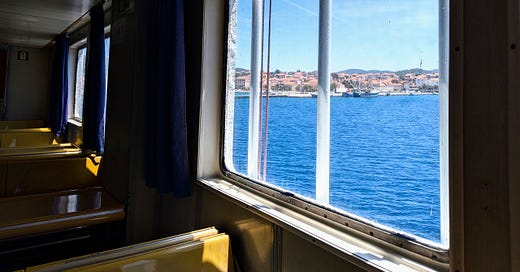I've spent too much time in the past few weeks doom-scrolling. This weekend, I tried to exist quietly in the world without it overtaking me. Hopefully, you, too, moved away from the screen and took a walk, a steamy bath, or sequestered yourself in a warm kitchen while sourdough starter bubbled over the side of a mason jar. Or maybe you ditched town for a few days.
In my last post, I talked about how Americans are too anxious, guilty, and fearful to take vacation days. The result? Over half of Americans fail to use all their paid vacation days each year.
What if, for two to three weeks a year, we shut down the late-stage Capitalist narrative and stopped working without anxiety and fear? Science says we'd feel a whole lot better.
Time Off Is Good For You. Really Good
First, it reduces health risks. Working long hours without breaks is associated with a higher risk of stroke and heart disease. Employees experiencing burnout are more prone to significant weight gain.
It also reduces stress and allows for more sleep, leading to fewer sick days.
A traditional vacation isn't enough to foster mental and physical well-being. Our brains must go quiet. Totally quiet until we are bored. Only then can we turn ideas into action.
Unplugging is crucial for cognitive functioning, especially for those in creative fields. Our brains are not so dissimilar to, say, our legs. We wouldn't think it normal to run a marathon every day for months at a time. So why do we think we can push out more work from exhausted brain cells? Have you ever tried to brainstorm new campaigns or write fresh content at 3 PM on a Friday after back-to-back meetings all week? I have. The results are somewhere between embarrassing and a monkey at a typewriter could have done better. It's absolute shit.
Completely Untethering From Work Until You're Bored Is Better
Going on vacation while checking email isn't enough to foster mental and physical well-being. Our brains must go quiet. Totally quiet until we are bored. Only then can we turn long-simmering ideas into action.
Become as bored as a misanthropic teenager on summer vacation in the early 1990s before the internet and cell phones. If we are talking about this narrator, specifically, bored as a teen in Western NY with a library card and pile of Anne Rice novels.
According to smart people, boredom has many benefits, including the ability to spark creativity. Sandi Mann, author of The Upside of Downtime: Why Boredom Is Good, explains the research.
At its core, boredom is “a search for neural stimulation that isn’t satisfied,” Mann says. “If we can’t find that, our mind will create it.” As demonstrated by the new study and plenty of others before it, boredom can enable creativity and problem-solving by allowing the mind to wander and daydream. “There’s no other way of getting that stimulation, so you have to go into your head,” Mann says. You may be surprised by what you come up with when you do.
Several years ago, I got so bored on a long weekend away that my brain started working again. I remember curling up in an oversized sweatshirt, taking out my laptop, and staring out the window. After 15 minutes, or maybe 45, I had new ideas that I was excited about. After only a few hours, I finished an essay that lingered in the back of my head for months. It wasn't great, but it was on paper. And then, I turned it into a shorter piece eventually published in Off Assignment.
I would have never written that piece if I didn't have time away to do nothing. My brain desperately needs quiet or white noise to function in a way that leads to anything interesting spilling out.
And that brings us to The Resistance. I recently read Rest Is Resistance: A Manifesto by Tricia Hersey. She describes how rest is not meant to support further Capatilism-driven bullshit. Don't rest for them. Rest for you.
“Productivity should not look like exhaustion. The concept of laziness is a tool of the oppressor. A large part of your unraveling from capitalism will include becoming less attached to the idea of productivity and more committed to the idea of rest as a portal to just be.”
In the coming weeks and months, as we try to make enough money to afford groceries while also resisting a hostile takeover, we’ll need energy and mental capacity. First, rest. Then spring into action, no matter how big or small. Here's some advice. (It's not lost on me that much of this is published in the British press).
Fighting for justice doesn’t have to be a big dramatic act. It can be small, Rebecca Solnit.
Trump’s neofascism is here now. Here are 10 things you can do to resist, Robert Reich
The '3.5% rule': How a small minority can change the world, (oldie from 2019).
Simple Sabotage Field Manual, printed by the US government in 1944, when we still believed Fascists were bad. (Thank you to the many people who shared this link).




